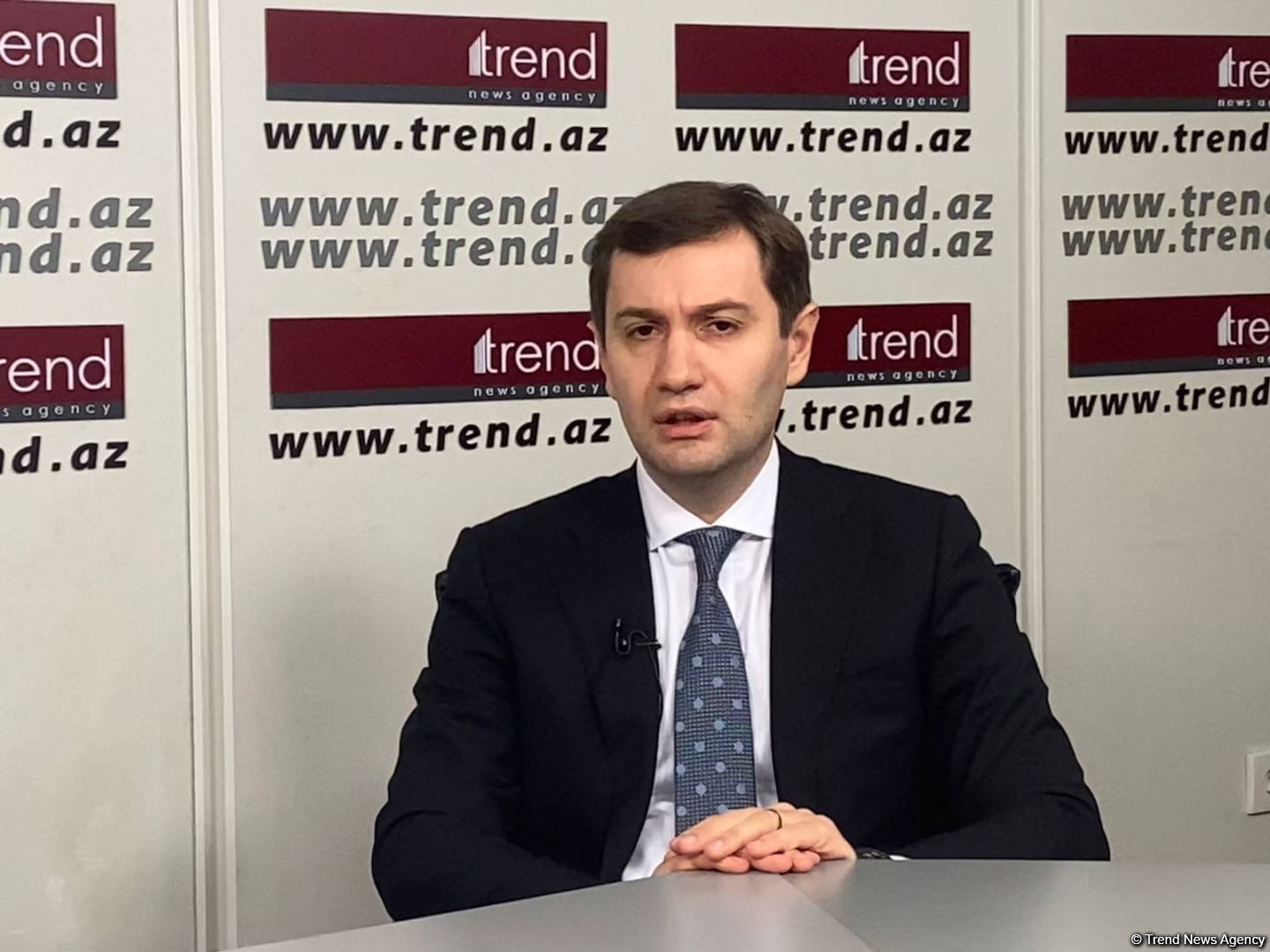BAKU, Azerbaijan, October 24. The Central Bank of Azerbaijan (CBA) intends to increase the share of cashless payments in the total turnover to 55 percent by 2022-2026, Executive Director at the CBA Farid Osmanov told Trend.
According to him, within Azerbaijan's Socio-Economic Development Strategy for 2022-2026, both in the banking and insurance sectors, capital market, digital transformation and the payment ecosystem, the CBA intends to implement projects aimed at further strengthening, expanding and increasing digital payments and opportunities in the country.
“As part of the implementation of these initiatives, two priority areas have been identified: financial stability and financial inclusiveness. In order to ensure financial stability, we can talk about projects aimed at strengthening the security of making payments through national payment systems and international standardization. So, Central Bank aims to annually increase payments by national payment systems by five percent. In the field of expanding financial inclusiveness, the Central Bank is taking measures to increase its share of cashless payments. CBA intends to increase its share of cashless payments in total turnover by 55 percent by 2026,” Osmanov said.
He noted that Central Bank is implementing a number of measures in order to accelerate digital transformation in the financial market, expand financial inclusiveness as well as provide banking services for clients on digital platforms and ensure access to financial services.
"Thus, for example, as part of digital payments for 2021-2023 strategy, the CBA is working in five following directions: expanding digital payment solutions, supporting and simplifying the procedure for entering the financial technology market, establishing a risk-based control procedure and appropriate framework, expanding financial inclusiveness in particular, minimizing the difference between cities and regions and stimulating the adoption of payment decisions," Osmanov said.
"In addition, the CBA is implementing a project aimed at simplifying the implementation of instant payments (Ani Pay). From this point of view, the bank is working to inform the population and business from January through September 2022, payments through the Ani Pay system increased by 2.2 times, and the number of transactions - by 3.4 times compared to the same period in 2021," he stated.
"Along with this, Central Bank wants banking processes to comply with international standards, and for this purpose, work is underway to implement the ISO 222 standard. I note that most of the information components of the national payment system of Azerbaijan have been brought into line with this standard. CBA believes that these works will be fully completed by the end of 2022 - the beginning of 2023. The introduction of this standard will allow us to simplify the automation of payment processes and increase the efficiency of reports," Osmanov informed.
"Here it's about the introduction of Open Banking in the country. The Central Bank, with the support of an international financial corporation, prepared a roadmap for 2021. This roadmap provides for the implementation of various activities in the period 2021-2025. Implementation of Open Banking will simplify entry into the market for fintech companies, ensure the availability of financial services, simplify integration with banks and provide a number of other benefits. I want to note that the preparation of relevant standards is being prepared by CBA. In particular, the bank is coordinating in this direction with the Bank Association and the Financial Technology Association," he said.
In addition, according to Osmanov, the Central Bank of Azerbaijan (CBA) carries out work on the development of digital manat [country’s national currency] in cooperation with international think tanks, financial organizations, and banks.
"Central Bank works with International Monetary Fund. Step-by-step work is underway to form the concept of digital currency. CBA is also conducting research to assess possible risks. I want to emphasize that these processes require a long period of time. Despite this, CBA continues cooperating and studying international experience and global concepts of digital currency," he stated.
Speaking on mechanisms for supporting and controlling the ecosystem of online payments, he said that the adoption of the law ‘On payment systems and services’ will determine the mechanisms in this area.
"CBA prepared and agreed upon the bill ‘On payment systems and services’ with the relevant state bodies and submitted it to the Azerbaijani government. During the preparation of this bill, the focus was made on international practice and leading technologies. Besides, the bill was formed on the basis of the directive on payment services and systems of the EU. I want to note that with the adoption of this bill, consumer protection mechanisms will be defined in the payments ecosystem and at the same time, a legal framework will be created to control the activities of organizations and operators of payment systems, as well as third-party service providers (which give information about accounts and intermediary services on payment transactions)," Osmanov said.
"This bill will enable us to create enhanced user authentication mechanisms. The bill also covers control measures for ‘Open Banking’. Measures of a special control regime will also be reflected in the law. This is about tools for supporting and monitoring fin-tech organizations, start-up projects and other players," he added.
"The bill also reflects issues regulating the activities of financial organizations, issues of ensuring safe and reliable payment systems and their efficient operation. It also reflects the rights of a paying agent (a legal entity or an individual entrepreneur engaged in accepting payments from individuals). Thus, the paying agent will receive the authority to legally carry out intermediary services, that is, payment transactions on behalf of banks, non-banking organizations and other financial institutions. The formation of a legislative framework for monitoring and controlling the activities of financial players will increase financial inclusiveness in Azerbaijan,” Osmanov informed.
He noted that Azerbaijan is open to new financial and financial technology companies.
“CBA is in constant communication with PayPal and Samsung Pay. I would like to note that the current legislation of Azerbaijan does not prevent foreign financial organizations from entering the market. The decision to enter any foreign organization on the market is made directly by these organizations themselves in accordance with their strategy and business plans,” Osmanov stressed.
He also informed that specialists of CBA and international financial corporations are preparing strategic programs on cybersecurity.
“During its preparation, international practice was taken as the basis. It’s not only about the technical strengthening of the infrastructure, but it’s also planned to conduct educational activities aimed at increasing knowledge. Besides, in order to form a clearer program, the regulator conducts appropriate surveys and assesses the activities of financial market players. In the near future time, we’ll be able to approve this program,” Osmanov concluded.












